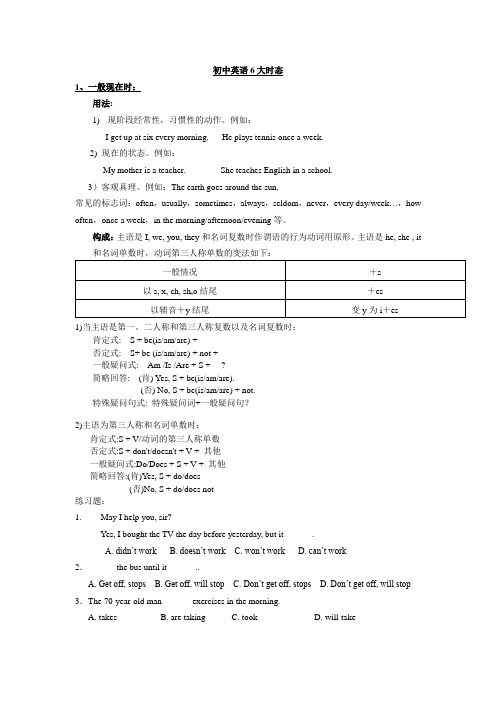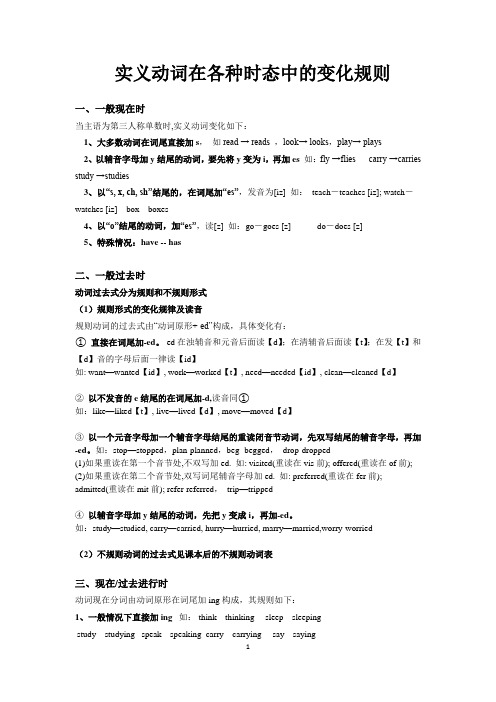(word完整版)初中英语六种时态一览表
(完整)初中英语6大时态

初中英语6大时态1、一般现在时:用法:1)现阶段经常性,习惯性的动作。
例如:I get up at six every morning. He plays tennis once a week.2) 现在的状态。
例如:My mother is a teacher. She teaches English in a school.3)客观真理。
例如:The earth goes around the sun.常见的标志词:often,usually,sometimes,always,seldom,never,every day/week…,how often,once a week,in the morning/afternoon/evening等。
构成:主语是I, we, you, they和名词复数时作谓语的行为动词用原形。
主语是he, she , it1)当主语是第一、二人称和第三人称复数以及名词复数时:肯定式: S + be(is/am/are) + ···否定式: S+ be (is/am/are) + not + ···一般疑问式: Am /Is /Are + S + ···?简略回答: (肯) Yes, S + be(is/am/are).(否) No, S + be(is/am/are) + not.特殊疑问句式: 特殊疑问词+一般疑问句?2)主语为第三人称和名词单数时:肯定式:S + V/动词的第三人称单数否定式:S + don't/doesn't + V + 其他一般疑问式:Do/Does + S + V + 其他简略回答:(肯)Yes, S + do/does(否)No, S + do/does not练习题:1.--- May I help you, sir?--- Yes, I bought the TV the day before yesterday, but it ______.A. didn’t workB. doesn’t workC. won’t workD. can’t work2.______ the bus until it ______..A. Get off, stopsB. Get off, will stopC. Don’t get off, stopsD. Don’t get off, will stop 3.The 70-year-old man ______ exercises in the morning.A. takesB. are takingC. tookD. will take用法:1).将要发生的动作。
六大基本时态电子版本

练习
1) I 2) He 3) He 4) They 5) We
(be) a teacher 2 years ago. (be) a student now. (do) his homework at home every day. (join) the Party in 1998. (not eat) apples yesterday.
一般过去时
动词变过去时的规则: 1. be动词:was, were 2. 一般在动词原形末尾+ed, e.g. work-worked, ask-asked 3. 以e结尾的动词+d, e.g. arrive-arrived, like-liked 4. 辅音字母结尾,双写+ed, e.g. shop-shoppped 5. 辅音字母+y结尾的单词,改y为i+ed, e.g. carry-carried, study-studied 6. 有些不规则变化,需要单独记忆: teach-taught, break-broke
六大基本时态
1. 一般现在时 2. 现在进行时 3. 一般将来时 4. 一般过去时 5. 现在完成时 6. 过去完成时
一般现在时
一般现在时是运用比较广泛的时态之一。 可以表示: 1)经常习惯性的动作或者存在的状态: e.g. I usually go to school on foot. *常见的时间状语:always, usually, often, sometimes, every day, in
一般将来时
表将要发生的事情或存在的状态,以及计划打算做的事情。 常见的时间状语:tomorrow, this afternoon, next year, one day, soon, in
(完整)初中英语6大时态(总7页)

(完整)初中英语6大时态(总7页)(一)一般现在时:I learn English everyday.He learns English everyday.(二)一般过去时I learned/learnt English yesterday.He learned/learnt English yesterday.(三)一般现在进行时I am learning English now.He is learning English now.(四)一般过去进行时I was learning English at 3:00 yesterday . He was learning English at 3:00 yesterday . (五)一般将来时1.be going to 表将来I am going to learn English tomorrow.He is going to learn English tomorrow..Will表将来I will learn English tomorrow.He will learn English tomorrow.(六)一般现在完成时.Since➕时间点I have (already) learnt/learned English since I was five years old.He has (already) learnt/learned English since he was five years old..for ➕一段时间I have (already) learnt/learned English for ten years.He has (already) learnt/learned English for ten years. Tips:learn-learns(三单)-learnt/learned(过去式)-learnt/learned(过去分词)•谓语结构及使用情况快速记忆:一般现在时:主语 + do/does (习惯性,经常性或有规律地发生的事情)一般过去时:主语 + did (过去发生的事情)一般将来时:主语 + will do (未发生的事情)现在进行时:主语 + am/is/are doing (当下正在发生的事情)过去进行时:主语 + was/were doing (在过去某个特定时间点或时间段正在发生的事情)现在完成时:主语 + has/have done(第一种情况:无时间状语,有关键词already,just,ever,never,yet,before,so far;讲述对现在依然存在影响的事情。
(完整)初中英语六大时态

六大英语时态一、一般现在时:(1)经常性、习惯性的动作或存在的状态Eg: I go to school on foot.(2) 主语的特征、性格、能力、爱好等Eg: I like watching TV.(3) 客观真理Eg: The moon moves round the earth.其结构按正常语序,即“主语+谓语+其他”。
有时为了起强调作用,时间状语也可提前。
一般现在时的句式变化可分为两种情况:○1一般人称做主语,表示动作变否定句时,须在动词前加助动词don’t;变一般疑问句时,须在句首加助动词do.Eg: 肯定句They have lunch at 12. 否定句:They don’t have lunch at 12. 一般疑问句: Do they have lunch at 12.○2第三人称单数作主语,谓语动词变单三;变否定句时,须在动词前加助动词doesn’t; 变一般疑问句时,须在句首加助动词does Eg: He does morning exercises.→He doesn’t do morning exercises.→Does he often go to school on foot?一般现在时的时间状语有on Saturdays, in the morning(afternoon, evening),every day, at weekend, how often及一些频率副词often, usually, always, sometimes, seldom, never 等。
动词变单三规则1. 一般情况下,在动词后直接加-s Eg: works, gets, says, reads2. 以s, x, sh, ch, o结尾,加-es Eg: goes, teaches, washes, does3. 以“辅音+y” 结尾,变y为i,再加-es Eg: fly-flies, study-studies4. 不规则变化have-has二、一般过去时:表示过去某时发生的动作或情况(1)过去某个时间所发生的动作或存在的状态Eg: He was a worker two years ago.(2) 过去一段时间内,经常性或习惯性的动作Eg: When I was a student, I often played with my classmates.(3)谈到已故人的情况时多用过去时Eg: Lu Xun was a great writer.(4) 有些发生时间不是很清楚(未明确表述)的情况,实际是过去发生的,也应用过去时态Eg: What did you say?一般过去时的结构是“主语+动词的过去式”。
初中英语时态总结模板一览表.doc

初中英语语法总结一览表语法项目构成用法一般现在时主语 +动词原形或者表示经常性的第三人称单数 -s / es 动作或状态一般过去时主语 +动词过去式表过去某个、段时间内动( did 或者 be—was/ were 作及状态主语 +be going to +动词原在将来某个时间或一般将来时形某段时要做的事will / shall + 动词原形象征词Every ?often ?always on 天季、节、年。
Ago / just now / In 1998week / yesterday 等tomorrow / afternext / tonight ?in 2010例句in 月、He goes to school every day.I often have lunch at home./last He wrote a letter yesterday.I was born in 1979.Are you going to read?He will come tomorrow.现在进行时主语 +be(am/is/are) + doing 表此时此刻正进行的动作或状态现在完成时主语 +have / has + 动词过去发生在过去影响在现在的分词现在完成进行时动作或状态等主语 +have/has been+ doing.过去进行时主语 +was / were +doing 表在过去某时间正在进行多用于复合句中的动作过去完成时主语 +had+动过去分词该动作发生在过去的过去多用于复合句中过去将来时主语 +would + 动词原形过去看来将要发生的动作多用宾语从句中或状态listen?look?nowTom is writing now.all the time?Don ’ tThey are lying on the bed.含糊的频率副词 ?already?just?never everHe has slept for two days.I have been teaching for 8 years.at this time yesterdayHe was reading at that timelast Sunday eveninglast Fridayby the time +过去时We had learnt 2000 wordswhen?after?before by the end of?last year.He said that heHe said that he would come here the nextthe next day .day .。
(完整word版)初中英语动词在各种时态中的变化规则

实义动词在各种时态中的变化规则一、一般现在时当主语为第三人称单数时,实义动词变化如下:1、大多数动词在词尾直接加s,如read → reads ,look→ looks,play→ plays2、以辅音字母加y结尾的动词,要先将y变为i,再加es如:fly →flies carry →carries study →studies3、以“s, x, ch, sh”结尾的,在词尾加“es”,发音为[iz] 如:teach-teaches [iz]; watch-watches [iz] box---boxes4、以“o”结尾的动词,加“es”,读[z] 如:go-goes [z] do-does [z]5、特殊情况:have -- has二、一般过去时动词过去式分为规则和不规则形式(1)规则形式的变化规律及读音规则动词的过去式由“动词原形+-ed”构成,具体变化有:①直接在词尾加-ed。
-ed在浊辅音和元音后面读【d】;在清辅音后面读【t】;在发【t】和【d】音的字母后面一律读【id】如: want—wanted【id】, work—worked【t】, need—needed【id】, clean—cleaned【d】②以不发音的e结尾的在词尾加-d,读音同①如:like—liked【t】, live—lived【d】, move—moved【d】③以一个元音字母加一个辅音字母结尾的重读闭音节动词,先双写结尾的辅音字母,再加-ed。
如:stop—stopped,plan-planned,beg- begged,drop-dropped(1)如果重读在第一个音节处,不双写加ed. 如: visited(重读在vis前); offered(重读在of前);(2)如果重读在第二个音节处,双写词尾辅音字母加ed. 如: preferred(重读在fer前); admitted(重读在mit前); refer-referred,trip—tripped④以辅音字母加y结尾的动词,先把y变成i,再加-ed。
初中英语六种时态归纳复习(精编word)
初中英语六种时态归纳复习时态是英语学习中一个至关重要的内容一、一般现在时:概念:经常、反复发生的动作或行为及现在的某种状况。
时间状语:always, usually, often, sometimes, every week (day, year, month…), once a week, on Sundays, etc.基本结构:①be动词;②行为动词否定形式:①am/is/are+not;②此时态的谓语动词若为行为动词,则在其前加don't,如主语为第三人称单数,则用doesn't,同时还原行为动词。
一般疑问句:①把be动词放于句首;②用助动词do提问,如主语为第三人称单数,则用does,同时,还原行为动词。
二、一般过去时:概念:过去某个时间里发生的动作或状态;过去习惯性、经常性的动作、行为。
时间状语:ago, yesterday, the day before yesterday, last week(year, night, month…), in 1989, just now, at the age of 5, one day, long long ago, once upon a time, etc.基本结构:①be动词;②行为动词否定形式:①was/were+not;②在行为动词前加didn't,同时还原行为动词。
一般疑问句:①was或were放于句首;②用助动词do的过去式did 提问,同时还原行为动词。
三、一般将来时:概念:表示将要发生的动作或存在的状态及打算、计划或准备做某事。
时间状语:tomorrow, next da y(week, month, year…),soon, in a few minutes, by…,the day after tomorrow, etc.基本结构:①am/is/are/going to + do;②will/shall + do.否定形式:①was/were + not; ②在行为动词前加didn't,同时还原行为动词。
(word完整版)初中英语时态语态总结表-推荐文档
肯定句
主+have/has+V.p.p+其他.
主+have/has+been+V.p.p+其他.
否定句
主+haven’t/hasn’t+V.p.p+其他.
主+haven’t/hasn’t+been+V.p.p+其他.
一般疑问
Have/Has+主+V.p.p+其他?
Have/Has+主+been+V.p.p+其他?
Am/Is/Are+主+V.p.p+其他?
简单回答
Yes,主+do/does. /No,主+don’t/doesn’t.
Yes,主+am/is/are. /No,主+am/is/are+not.
Yes,主+am/is/are. /No,主+am/is/are+not.
Yes,主+am/is/are. /No,主+am/is/are+not.
简单回答
Yes,主+情态动词. /No,主+情态动词+not.
Yes,主+情态动词. /No,主+情态动词+not.
初中英语时态语态总结表
时态名称
主动语态
被动语态
一般现在时
肯定句
主+V/V三单+其他..主+V系+表语.
主+am/is/are+V.p.p+其他.
否定句
主+don’t/doesn’t+V+其他.
初一到初三英语所有时态总结
初一到初三英语所有时态总结01、一般现在时概念:经常、反复发生的动作或行为及现在的某种状况。
时间状语:always, usually, often, sometimes, every week (day, year, month…), once a week, on Sundays, etc.基本结构:①be动词;②行为动词否定形式:①am/is/are+not;②此时态的谓语动词若为行为动词,则在其前加don't,如主语为第三人称单数,则用doesn't,同时还原行为动词。
一般疑问句:①把be动词放于句首;②用助动词do提问,如主语为第三人称单数,则用does,同时,还原行为动词。
02、一般过去时概念:过去某个时间里发生的动作或状态;过去习惯性、经常性的动作、行为。
时间状语:ago, yesterday, the day before yesterday, last week(year, night, month…), in 1989, just now, at the age of 5, one day, long long ago, once upon a time, etc.基本结构:①be动词;②行为动词否定形式:①was/were+not;②在行为动词前加didn't,同时还原行为动词。
一般疑问句:①was或were放于句首;②用助动词do的过去式did 提问,同时还原行为动词。
概念:表示现阶段或说话时正在进行的动作及行为。
时间状语:now, at this time, these days, etc.基本结构:am/is/are+doing否定形式:am/is/are+not+doing.一般疑问句:把be动词放于句首。
04、过去进行时概念:表示过去某段时间或某一时刻正在发生或进行的行为或动作。
时间状语:at this time yesterday, at that time或以when 引导的谓语动词是一般过去时的时间状语等。
(完整)初中英语六大时态
六大英语时态一、一般现在时:(1)经常性、习惯性的动作或存在的状态Eg: I go to school on foot.(2) 主语的特征、性格、能力、爱好等Eg: I like watching TV.(3) 客观真理Eg: The moon moves round the earth.其结构按正常语序,即“主语+谓语+其他”。
有时为了起强调作用,时间状语也可提前。
一般现在时的句式变化可分为两种情况:○1一般人称做主语,表示动作变否定句时,须在动词前加助动词don’t;变一般疑问句时,须在句首加助动词do.Eg: 肯定句They have lunch at 12. 否定句:They don’t have lunch at 12. 一般疑问句: Do they have lunch at 12.○2第三人称单数作主语,谓语动词变单三;变否定句时,须在动词前加助动词doesn’t; 变一般疑问句时,须在句首加助动词does Eg: He does morning exercises.→He doesn’t do morning exercises.→Does he often go to school on foot?一般现在时的时间状语有on Saturdays, in the morning(afternoon, evening),every day, at weekend, how often及一些频率副词often, usually, always, sometimes, seldom, never 等。
动词变单三规则1. 一般情况下,在动词后直接加-s Eg: works, gets, says, reads2. 以s, x, sh, ch, o结尾,加-es Eg: goes, teaches, washes, does3. 以“辅音+y” 结尾,变y为i,再加-es Eg: fly-flies, study-studies4. 不规则变化have-has二、一般过去时:表示过去某时发生的动作或情况(1)过去某个时间所发生的动作或存在的状态Eg: He was a worker two years ago.(2) 过去一段时间内,经常性或习惯性的动作Eg: When I was a student, I often played with my classmates.(3)谈到已故人的情况时多用过去时Eg: Lu Xun was a great writer.(4) 有些发生时间不是很清楚(未明确表述)的情况,实际是过去发生的,也应用过去时态Eg: What did you say?一般过去时的结构是“主语+动词的过去式”。
- 1、下载文档前请自行甄别文档内容的完整性,平台不提供额外的编辑、内容补充、找答案等附加服务。
- 2、"仅部分预览"的文档,不可在线预览部分如存在完整性等问题,可反馈申请退款(可完整预览的文档不适用该条件!)。
- 3、如文档侵犯您的权益,请联系客服反馈,我们会尽快为您处理(人工客服工作时间:9:00-18:30)。
主语+ have / has +过去分词+…
句
型
变
化
疑
问
式
1. Be +主语+…?
2. Do/Does +主语+
动词原形+…?
1. Was/Were +主
语+…?
2. Did +主语+
动词原形+…?
Be +主语+动词的现在分词+…?
Was / Were +主语+动词的现在分词+…?
tomorrow;the day after tomorrow; next day/week/month/year/term; soon; in a few minutes; by+年份; in+时间状语;in the future; in future
already, yet, just, ever, never, before, for +时间段,since+时间点
构成
方式
1.动词be(am/is/are)
+表语…
2.动词原形+…
(主语是第三人称单
数,动词也用第三人称单数)
1.动词was/were
+表语
2.实义动词的过
去式+…
be(am/is/are) +
动词的现在分词
was / were +动词的现在分词
1. will/shall +动词原形
(shall用于第一人称)
时间标志
频度副词:always,often,usually,sometimes,seldom,never;everyday,every week,every month,every year等
the day before yesterday, yesterday, last/ yesterday night, last week, last month, last year, last term; in/on+过去时间;时间+ago; just now, at the age of 5, one day, long long ago; once upon a time
动词原形+…
主语+ be + not
+动词的现在分词+…
主语+
wasn’t (was not) /
weren’t (were not) +动词的现在分词+…
1.主语+ will/shall not +动词原形+…
2.主语+ be + not + going to +动词原形+…
主语+ haven’t / hasn’t +过去分词+…
六种时态一览表
时态一般现在时Fra bibliotek一般过去时现在进行时
过去进行时
一般将来时
现在完成时
用法
表示经常性发生的动作、习惯性动作或客观真理、科学事实等。
表示过去某个时间发生的动作或存在的状态。
表示现在或现阶段正在进行或发生的动作。
表示过去某时正在进行的动作或存在的状态。
表示将来某个时间要发生的动作或存在的状态。
表示过去发生或者未发生的事对现在造成的影响或结果。
now, at the moment, at this moment, just now, look, listen, at
present, these days,
this week
just then, at this moment yesterday, yesterday morning/ afternoon/evening, at that time, this morning, the whole morning, all day yesterday, from+时间数+to+时间数+last night, those days或以when, while引导的谓语动词是一般过去时的时间状语等。
1. Will/Shall +主语+动词原形+…?
2. Be +主语+ going to +动词原形+…?
Have / Has +主语+过去分词+…?
否
定
式
1.主语+ be + not +…
2.主语+don’t/doesn’t
+动词原形+…
1.主语+ was/were
+ not +…
2.主语+ didn’t +
